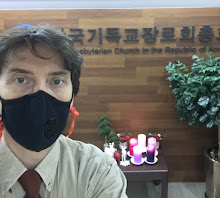It's cherry blossom season in Seoul! On Saturday I got lost coming home from the supermarket and suddenly found myself walking along a street lined with beautifully tinted trees swaying slightly in the breeze. It won’t last, I’m told. They’ll be here today and gone in a few days. Even this morning I observed little bits of confetti scattering on the sidewalk on my way back from Yonsei University.
An incredibly fragile, short-lived miracle; a message. But only if I am willing to pay attention. What is it saying?
Let me juxtapose this with the Lenten worship service that I went to last night, hosted by the human rights committee of the National Council of Churches of Korea, which focused on migrants and refugees. It was very moving. Koreans are a deeply religious people: Christians, Buddhists, whatever, but this does not necessarily make them any more open to foreigners than others. In recent years especially, Korea has reached out to welcome foreigners, but in Korea, as elsewhere, there is also a great deal of hostility to foreigners. Are there resources within our religious traditions for helping us to counterbalance that all-too-common tendency to distrust strangers?
The service reminded me that in the midst of my busy life, there is the rhythm of Lent that calls us to recognize the work of redemption that God has undertaken in the world. Jesus dying on the cross is the concrete expression of that work. But this is not merely “religious” work, or work that has taken place in some distant time in the past. Even as Lent pulls us out of our everyday life, it sends us back into the world where there is so much suffering—suffering that we might not want to open ourselves to. This was beautifully blended into the service. It was moving to hear the personal stories of the participants, some quite painful: migrant workers, for example, who have followed all the rules in coming here but then end up needing to switch employers, and suddenly find themselves crossing the line and becoming “undocumented,” and hence “criminal”; refugees, who did the right thing in standing up to injustice in their home country, only to discover themselves needing to flee for their lives, having to become “refugees.”








Comments
Post a Comment